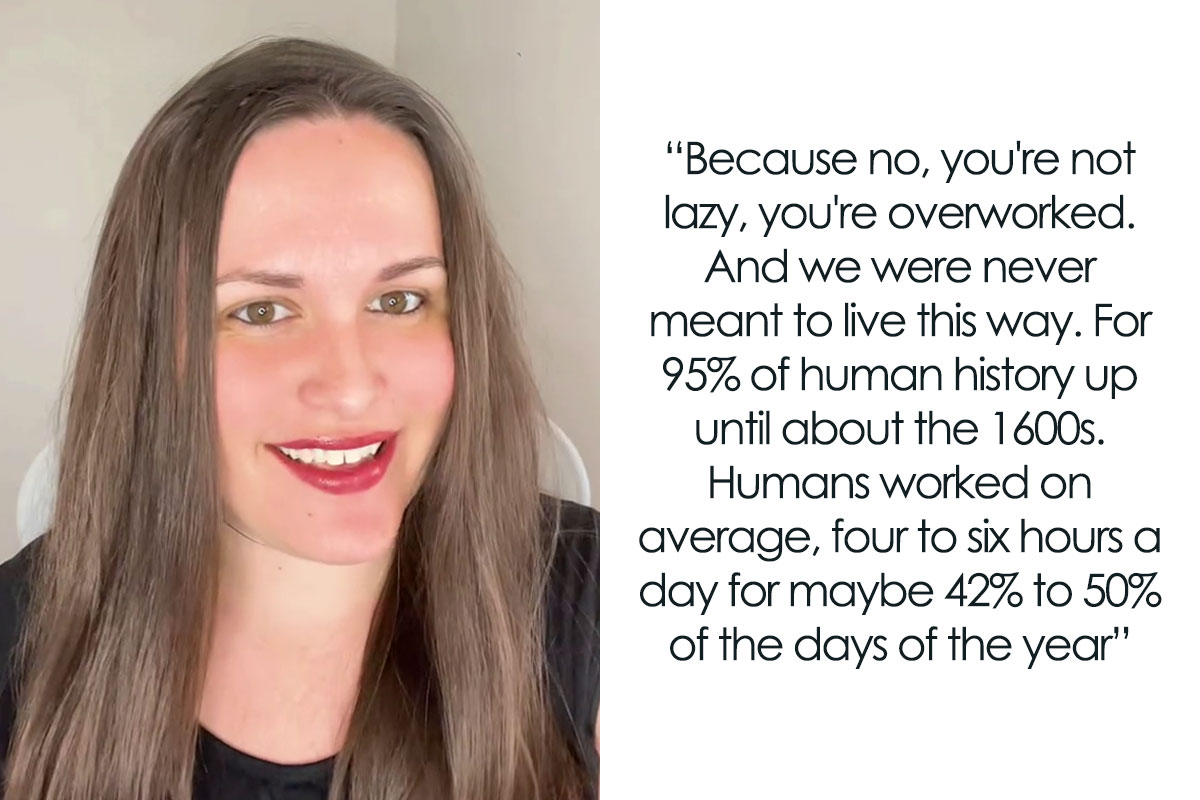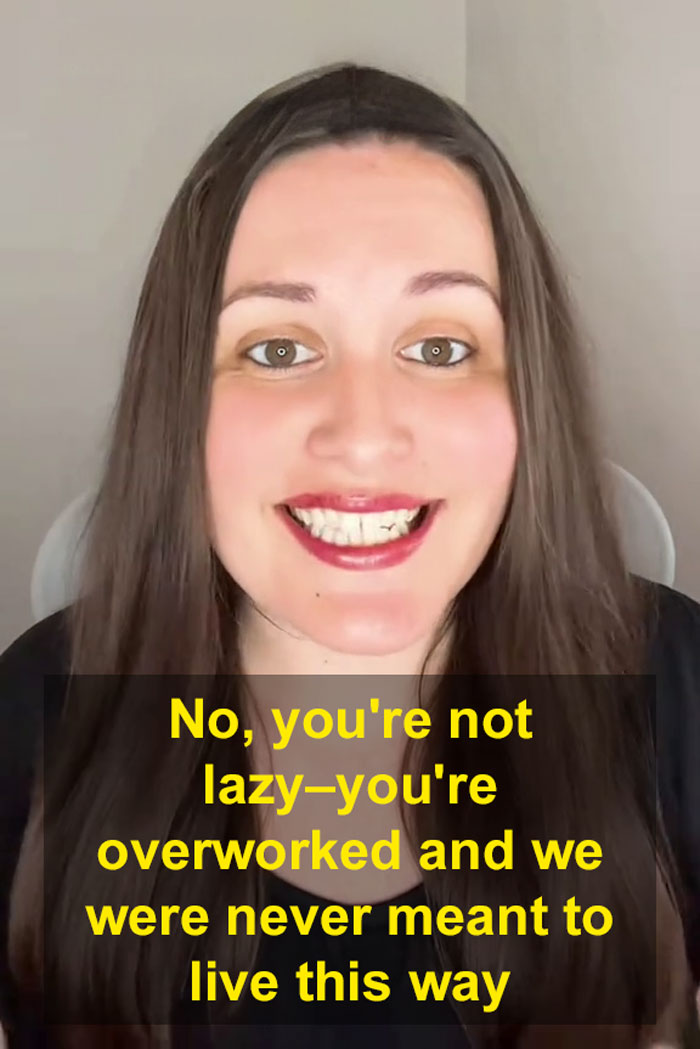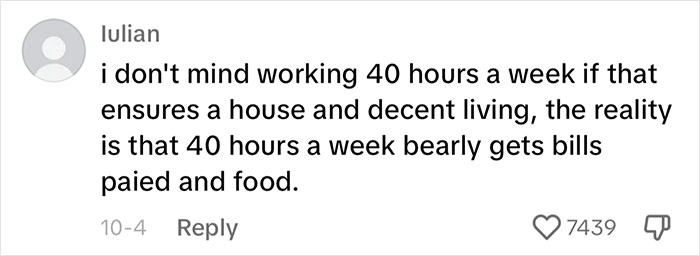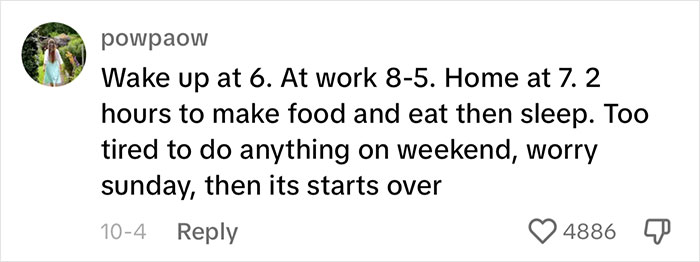
Reformist Goes Viral For Pointing Out Changes That Were Made By Capitalists To Make People Work More
Do you often feel tired when you come home after working the whole day? Even if it’s an office job that may seem like you are not doing anything too strenuous, it still feels exhausting. And do you also sometimes feel like you are overworking, but you work the normal 8-hour workday and you feel like maybe you are just being weak or lazy?
Well, according to this reformist – whose video on TikTok went viral after she explained in detail how humans work more today than they ever have in history – if you feel like you are being lazy, you are actually being overworked.
More info: TikTok
We are used to 8-hour workdays being the norm, but it wasn’t always this way
Image credits: Antoni Shkraba (not the actual photo)
This woman explains that humans have never worked this much in history, and the reason for this are changes made by capitalists
Image credits: debateher
“No, but seriously, it’s 2023. And humans are working more today than they ever have in history. So how did we get here?”
“Great question. I would love to tell you.
“Because no, you’re not lazy, you’re overworked. And we were never meant to live this way. For 95% of human history up until about the 1600s, humans worked, on average, 4 to 6 hours a day for maybe 42% to 50% of the days of the year.
“Work was done leisurely and self paced and long breaks for food, naps, and avoiding the hottest hours of the day was expected and the norm. These patterns are so prevalent across cultures, it’s believed that this is the natural working rhythm that humans prefer.
“What changed? How did we go from working a few hours a day less than half of the days of the year to this? Well, a few things.”
Image credits: debateher
“It was a series of changes made by capitalists for capitalists to slowly push the tolerance of workers to get us to where we are”
“Starting with clocks. Gone were the days of showing up to work when you were ready, instead you were expected to be there at a set time. Now, at first, workers didn’t comply to this, so the capitalists worked hand in hand with the government to make being late to work a punishable crime.
“So, after that forced compliance took hold, the boundaries were pushed a little further. Standardized and significantly reduced break times, less and less holidays and instead of having a few weeks off multiple times a year, most employees now maybe got a vacation right around Christmas.
“The traditional public school model that we were all raised in was literally designed to create obedient workers who wouldn’t question how much freedom they have. It only took a few generations for humans to go from working as needed to working long hours with short breaks most of the year. No time for rest, hobbies for your family, nothing.
“Profit margins and GDP skyrocketed but workers were making less than ever before. This trend of a few capitalists at the top working hand in hand with the government to slowly milk as much labor out of the population as possible, while cutting costs as much as possible, just compounded year after year.
“Meanwhile, corporate consolidation ensured that fewer and fewer people actually reaped the benefits of capitalism. Leading us to where we are today, where we’re the richest society has ever been but the wealth inequality is so great that the majority of us are barely scraping by.”
Image credits: Tara Winstead (not the actual photo)
The woman is a content creator and reformist, who is best known as @debateher on TikTok and YouTube. She has over 18.4K followers on these platforms and mostly creates content highlighting economical and political issues.
The video in which she highlighted the overworking issue went viral instantly and just a little bit more than a month later, it has collected more than 4.1 million views, 529K likes, and almost 11K comments. People in the comments agreed with the woman and shared their frustration over these normalized things that make their lives miserable.
“I always wonder how people have time to have hobbies, a clean house, a social life & work the whole day without being absolutely exhausted,” one user wrote. “Maddening that we went from enjoying working and therefore wanting to work, to having to work +40hr weeks so that we can live another work day,” another shared.
However, there were also some people who didn’t fully agree with this statement. “People like to say this but it’s worth remembering that agricultural labor is very different from office labor,” one person emphasized. “Generations of workers have gone on strike to work at least 8 hours a day instead of 12 or worse,” another disagreed with the creator.
Image credits: Yan Krukau (not the actual photo)
Now, let’s look at the facts of the historical data of working hours. According to Hubstaff, over time, the weekly working hours have changed. During the Industrial Revolution, they peaked and then gradually declined to the lower levels at which we operate today – the typical workweek of eight hours a day, five days a week.
Compared to us, our ancestors worked far fewer hours. Approximately 1,440 hours were spent annually by laborers in the late fourteenth century. However, working hours increased dramatically throughout the Industrial Revolution. Many laborers worked six days a week, ten hours a day.
Moreover, the typical worker anticipated working eight hours a day, six days a week, by the 1920s. There was no national regulation for working hours until the Fair Labor Standards Act was approved by the US Congress in 1938. And looking at today – the average annual workweek for American workers now is 1,757 hours and for European counterparts – 1,500 hours.
On that note, there have been plenty of discussions about making a 4-day work week with some companies already implementing it. Maryville University states that the benefits of this include better work-life balance, more energy, better mental health, and equal or even better productivity.
However, as with almost everything, there are a few drawbacks – this causes more stress and fatigue as it may make it difficult for employees to complete tasks in fewer hours if businesses don’t restrict distractions like emails and prolonged meetings. Another disadvantage is less coverage on shifts and less employee engagement.
Anyway, guys, what do you think about this reformist’s statement? Do you agree with it or do you have a different opinion about the whole 40-hour work week? Share your thoughts in the comments below!
You can check out the full video below:
@debateher #stitch with @BeevesOfTime #capitalism #anticapitalism #overworked ♬ original sound – Debate Her
People online shared their frustration and agreed that they are tired of being overworked and something needs to be done about it
this s**t again? you think people in the past worked less than now? in the time when you had to make everything yourself, chop fire wood, take care of your animals, trade any excess products you had on a market, take care of several kids of which 50% died, cooking and cleaning without appliances, get water from a well, but sure nowadays working in your airconditioned office 40 hours a week is the craziest time in history.
Every historical source I've ever read sais this. Every single anthropologist says this, sociologists tell this. But no one wants to believe it because we're so far removed from it that it seems unbelievable. But so far I couldn't find even one credible, scientific source that contradicts the statement that in the past people have worked a lot less. So yes, unless someone shows me sources and scientific proof that this is not true, I have no problem believing that.
Load More Replies...What about the times when people had no breaks for washroom, lunch was at best 15 minutes or while working, sunrise to sunset and sometimes more, 1/2 day per week when employer was generous? Lots of people died of exhaustion, disease, etc. And before that, people had to hunt for food, get everything they could from that, and I mean EVERYTHING, including the tendons, fat, heart, eyes, when humans started seeding plants, there was a lot of work involved in that too - did you never get the chance to plant a great garden? - let's not forget that they also needed to protect themselves from the weather and foes. Where did you get your stats??? You're ridiculous.
There are hunter gatherer societies around to this day. Those people support themselves with about 4 or5 hours of effort per day. Of course, they don't get days off, but still....
Load More Replies...this s**t again? you think people in the past worked less than now? in the time when you had to make everything yourself, chop fire wood, take care of your animals, trade any excess products you had on a market, take care of several kids of which 50% died, cooking and cleaning without appliances, get water from a well, but sure nowadays working in your airconditioned office 40 hours a week is the craziest time in history.
Every historical source I've ever read sais this. Every single anthropologist says this, sociologists tell this. But no one wants to believe it because we're so far removed from it that it seems unbelievable. But so far I couldn't find even one credible, scientific source that contradicts the statement that in the past people have worked a lot less. So yes, unless someone shows me sources and scientific proof that this is not true, I have no problem believing that.
Load More Replies...What about the times when people had no breaks for washroom, lunch was at best 15 minutes or while working, sunrise to sunset and sometimes more, 1/2 day per week when employer was generous? Lots of people died of exhaustion, disease, etc. And before that, people had to hunt for food, get everything they could from that, and I mean EVERYTHING, including the tendons, fat, heart, eyes, when humans started seeding plants, there was a lot of work involved in that too - did you never get the chance to plant a great garden? - let's not forget that they also needed to protect themselves from the weather and foes. Where did you get your stats??? You're ridiculous.
There are hunter gatherer societies around to this day. Those people support themselves with about 4 or5 hours of effort per day. Of course, they don't get days off, but still....
Load More Replies...

































18
22